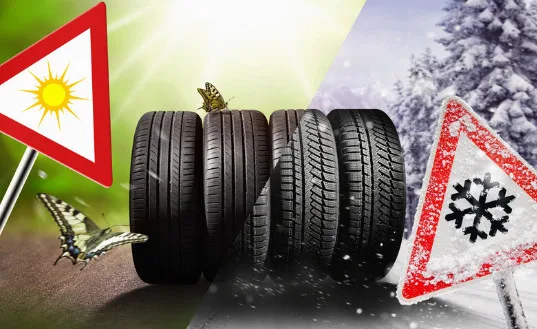Can you use Canadian Winter Tires in Summer?

Almost all Canadian drivers have asked themselves this very question at one point or another. After installing winter tires on your car for a harsh winter, come springtime you start to wonder if it’s really necessary to swap out your winter tires for summer tires. We understand the temptation, especially since it’s usually more convenient and sometimes more cost-effective to leave the same tires on your car year-round. Below, we answer this question in detail, providing you with a clear answer once and for all as to whether it’s a good idea to use winter tires during the summer months

ALL-SEASON TIRES
All-season tires are the most popular tires amongst Canadian drivers for a reason. The main reason being that they perform well in a wide range of weather conditions. Think of all-season tires as a cross between winter and summer tires, combining the unique features of both into one hybrid model.
Though they’re best suited to temperatures of 7 degrees Celsius and above, many all-season tires can provide traction in light snow or slushy conditions, not to mention in the rain or on hot, dry asphalt. Their superior performance in a wider variety of weather, coupled with the convenience that comes with not having to change out your tires each season, has led many Canadians to invest in quality all-season tires. Thus, if you’re looking for a way to avoid swapping out your winter tires for summer tires every season, all-season tires might be the ideal solution.
HOW ARE WINTER TIRES DIFFERENT FROM SUMMER TIRES?
Though you might be tempted to leave your winter tires on all year, there are several key differences between summer and winter tires that prevent either from being a suitable year-round option in Canada. Summer tires, which are sometimes marketed as performance tires, are engineered specifically for warmer weather of 7 degrees Celsius and above. They often have dedicated rubber compounds that allow them to provide exceptional grip and handling on both wet and dry roads in warmer temperatures.
Summer tires are also designed to generate less road noise and to be more fuel-efficient thanks to their reduced rolling resistance. Features of summer tires generally include a simple tread design with fewer grooves and larger tread blocks, along with softer rubber. In contrast, the tread compound of winter tires has a higher concentration of natural rubber, allowing them to stay flexible even when temperatures drop. Winter tires typically have a deeper tread pattern and lots of sipes to help excavate snow, slush, and water from the tires, vastly improving traction and hydroplaning resistance. In essence, winter tires are engineered to provide enhanced steering, grip, and traction in harsh winter conditions, such as sub-zero temperatures and deep snow. This makes them an ideal option for any Canadian who frequently drives on snowy or icy roads in the winter.
WHY YOU SHOULDN’T USE WINTER TIRES IN WARMER TEMPERATURES
As you now know, summer and winter tires are not interchangeable. They are engineered to provide traction and comfort based on the weather they were intended to be driven in. Simply put, winter tires are not suitable for use in warmer temperatures. Although they are impeccable at driving on wet roads in the winter, it’s been proven that wet asphalt in warm summer temperatures is a challenge for winter tires. Plus, in summer conditions, the deep, densely-siped tread compound of winter tires delivers slower, less precise steering, making the vehicle feel less stable.
Further, winter tires have a higher rolling resistance than summer tires, which will lead to higher fuel consumption and road noise if used in the summertime. Yet another reason to avoid using winter tires in the summer is that doing so will cause them to wear down much quicker. The tread compound of winter tires is far too soft for driving on hot, dry asphalt, which produces more heat, causing tire components to break.
Similarly, summer tires should not be used in the winter. While the road-gripping, noise-reducing design of summer tires is certainly optimal for spring and summer weather in Canada, it becomes a detriment in cold weather. This is because when temperatures drop below 7 degrees, the soft rubber compound hardens, becoming brittle. This brittle tread compound can start to chip or crack, and most importantly, significantly reduces traction, whether there is snow on the road or not.
When it comes down to it, winter tires should never be used during the warmer seasons, and summer tires should never be used in colder seasons. Doing so will not only make driving your vehicle less safe, but it is a sure-fire way of shortening the lifespan of your tires.
Note: In Canada, it is not illegal to use winter tires during the summer, but it is generally not recommended for the reasons aforementioned.
WHEN SHOULD I CHANGE TIRES?
As all Canadians know, spring weather in Canada is unpredictable. This means that rather than swapping out your winter tires on a certain date each year, it’s better to go by temperature. As mentioned above, winter tires perform best in temperatures of 7 degrees Celsius or below. So when your average daily temperatures are consistently over 7 degrees, it’s time to swap out those winter tires for a summer or all-season model.
A BETTER WAY TO BUY TIRES IN CANADA
Tire Warehouse makes the shopping experience faster and easier than ever for our customers. We offer a wide variety of top brands, helping you find the perfect tires that meet your unique needs. Once you find your perfect tires, you can check out confidently using your preferred payment method, and then choose how you want us to get your tires to you! Tire Warehouse will deliver tires directly to your home, or set you up with one of our preferred installers in your region. Shopping for tires has never been easier!
In stock & ready to ship
Find the tires you need, delivered from a warehouse near you
